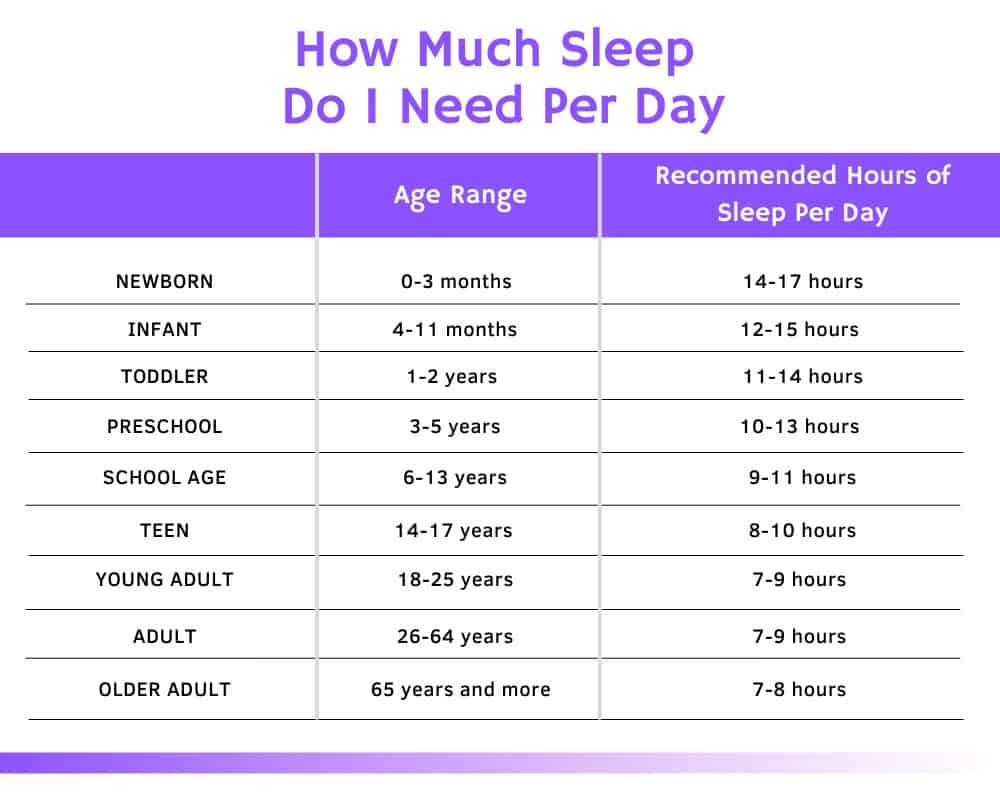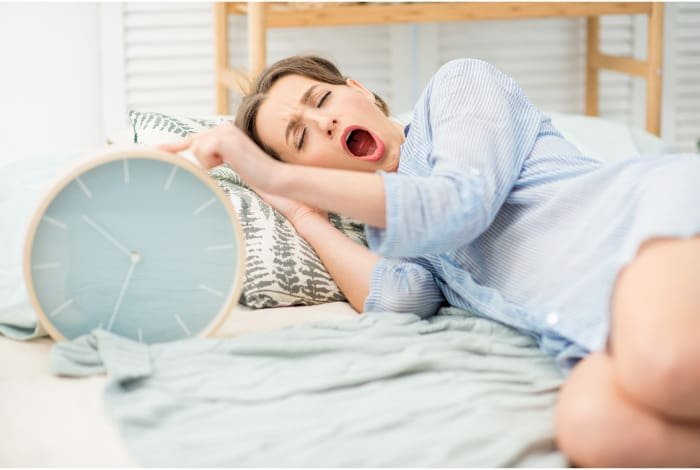
Rip Van Winkle took a mysterious drink and slept for 20 long years. He is the character in a story by American author Washington Irving. All of us need sleep. But the pertinent question is how much sleep do we really need. Sleep is indispensable for the preservation of physical and mental health. Sleep smoothens and enhances productivity, emotional balance, brain and heart health, creativity and vitality.

As per the guidelines of the National Sleep Foundation, healthy adults need sleep between 7 and 9 hours. Babies and young children need even more sleep for their healthy growth and development. People over 65 years should get sleep for 7 to 8 hours. Loss of sleep will affect your mood, energy, mental sharpness and ability to handle stress. The long-term chronic sleep loss can play havoc on your mental and physical health. When you are asleep, your brain remains active and oversees biological maintenance that keeps your body running in fine condition that prepares you for the day ahead. Without enough hours of sound sleep, it is not possible to work, learn, create and communicate at a potential level. If you are getting enough sleep hours, you’ll feel energetic and alert during the next day from the moment you wake up until you go to bed.
How to sleep better at night?

Sound sleep requires improving your sleep hygiene which includes your bedroom setting and sleep-related habits. Here are some tips to sleep better at night.
1. Use a comfortable mattress and pillow
Choose a comfortable mattress and pillow for a peaceful and sound sleep. Make sure that the mattress is highly supportive and comfortable to offer you maximum relaxation while sleeping. Outfitting your mattress with quality pillows would be a great idea for a night of better sleep.
2. Use quality bedding
Choose a quality bedsheet and blanket that soothes you into a deep sleep. The bedsheet and blanket should always be soft and smooth. It should also be able to maintain a comfortable temperature at night while you sleep.
3. Make bright light exposure a routine during the day
Exposure to bright light or natural sunlight during the day helps regulate the circadian rhythm or circadian cycle. The circadian rhythm or circadian cycle is an internal process in every human to regulate the sleep-wake cycle. It is a natural time-keeping clock within your body. It tells your body when to stay awake and when to sleep. The daytime exposure to bright light improves the sleep quality and duration at nighttime. So try getting daily sunlight for at least two hours or more to improve the sleep quality at night.
4. Avoid exposure to blue light just before bedtime
Exposure to light just before sleep is not a good idea and can keep you sleepless at night. Your brains secrete a naturally occurring hormone called melatonin. This hormone helps in regulating the sleep-wake cycle. Your brain secretes more melatonin in the dark, which enables you to sleep well. Due to the effect of circadian rhythm, exposure to light in the nighttime tricks your brain into thinking that it’s still daytime. This makes your brain secrete less melatonin making you alert at night. Here is how you can reduce exposure to light during the nighttime:
- The blue light emitted by your phone, tablet, computer, or TV is the worst in this regard. Avoid using these electronic devices at least two hours before going to bed.
- Download an app named f.lux on your laptop or computer to block the blue light.
- Activate the blue light filter on your iPhones and Android smartphones to block the blue light.
- Say no to late-night binge-watch and try listening to music or audiobooks instead.
- Stop reading with backlit devices like a tablet which are more disruptive than e-readers.
- Please make sure the room is dark when it’s time to sleep. You can also use a curtain or a sleep mask for blocking light from windows.
- Using a dim nightlight or a flashlight for moving around will make it easier for you to fall back to sleep.
5. Keep an eye on caffeine intake
Caffeine is consumed by a lot of people for improving energy and focus. Caffeine consumption makes you more active and helps in overcoming daytime sleepiness. However, you may be surprised to know that consuming caffeine late in the day will prevent you from falling asleep at night. Therefore, avoid drinking coffee in the afternoon after 3 p.m. as it can deprive you of getting sleep.
6. Reduce long afternoon naps
Short power naps are good for improving brain function and making up for lost sleep. But irregular and long daytime naps can make things worse that you might end up not getting a good sleep at night. Limit nap time to 20 to 30 minutes in the afternoon. However, if you take regular naps during the daytime and sleep well at night, you shouldn’t worry as the effect of daytime napping may be different for every people.
7. Sleep and wake at the same time every day
The circadian rhythm in your body functions like the body’s internal clock. Irregular sleep patterns will modify the circadian rhythm and melatonin level in your brain, thus resulting in poor sleep. The people who go to sleep late at night on weekends also experience poor sleep quality. If you need to make up for a late-night, go for a daytime nap rather than altering the regular sleep schedule. After several days of going to bed and waking up at the same time every day, you may not even need an alarm for waking up in the morning.
8. Avoid taking alcohol before going to bed
Alcohol consumption before going to bed not only causes disrupted sleep patterns but also increases the symptoms of sleep apnea and snoring. Alcohol consumption affects your body’s circadian rhythm as it modifies nighttime melatonin production. Thus you end up getting poor sleep at night.
9. Optimise your sleep environment
Bedroom setup is an important factor for getting good sleep at night. Keep your bedroom cool, dark and quiet. External noise from traffic and neighbours can cause a poor sleep environment. Using earplugs can prove beneficial in these circumstances. A bedroom with a cool temperature and proper ventilation is a good environment for getting good sleep. Extreme temperatures in a bedroom like too hot or too cold will deprive sleep at night. Make your bedroom a place for sleep rather than for work, watching TV or using the phone or laptop. Your bedroom should be a quiet and clean place that you can relax and sleep soundly.
10. Relax and calm down your mind
Worry, stress and anger can make it very difficult for you to sleep at night. Relaxation techniques before going to bed could help you get sound sleep. You can try developing a habit of listening to soft or relaxing music, listening to an audiobook, taking a warm bath, dimming the lights and deep breathing. Try these relaxation techniques and find out the best one that works for you to clear the mind to get a sound sleep.
11. Exercise during the daytime
Regular exercise during the daytime helps to sleep better at night. Exercise helps to speed up the metabolism rate and elevates the body temperature. But exercising too late in the day causes adverse effects on your sleep. Avoid moderate to vigorous exercises at least three hours before bedtime. If you still fail to sleep at night, then try exercising even earlier in the daytime. Doing yoga and stretching exercises in the evening can help you to get good sleep. Insomniac people can exercise daily to get good sleep as it offers better results than most drugs. Regular exercise during the daytime is the best way to ensure a good night of sleep.
The Bottom Line
Sleep is one of the most important things that you shouldn’t compromise in your life. It brings happiness, wealth, prosperity and, most importantly, keeps you healthy and fit. Insufficient sleep causes the risk of obesity in children as well as adults. The risk of developing heart disease and type 2 diabetes is also high if you do not sleep for 7 to 8 hours.
So, sleep better at night by adopting the above tips and lead a better life.